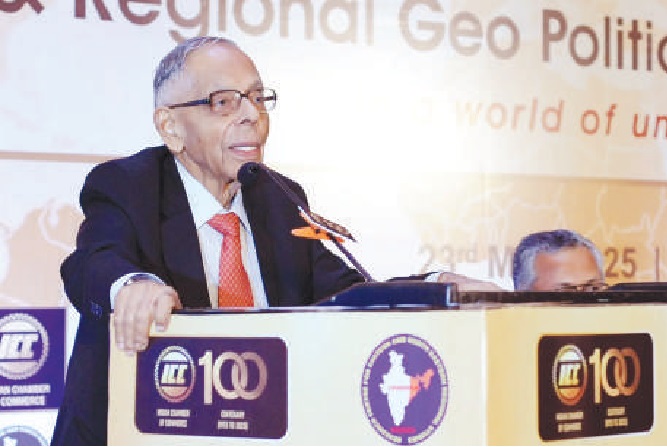Kolkata: India missed a critical opportunity to “split Western Pakistan” after both the 1965 and 1971 wars, says former National Security Adviser (NSA) M.K. Narayanan.
“Now it is difficult for India to defeat terrorism without eliminating the terrorist state,” he told The Sunday Guardian.
“Both in 1965 and 1971, we made one serious mistake. We did not split Pakistan and divide it into a set of principalities, which is what Pakistan essentially is today,” Narayanan said, referring to g insurgencies in the Balochistan and Khyber Pakhtunkhwa provinces.
He added that after the 1971 war and the creation of Bangladesh from what was East Pakistan, India had hoped Pakistan would have “learned a lesson.”
Narayanan, known as a hardliner on Pakistan during the Manmohan Singh-led UPA government and who served as NSA from 2005 to 2010, said intelligence officials should have been better prepared for the current conflict that began with the Pahalgam terror attack on April 22, especially following a speech by Pakistan Army Chief General Asim Munir a week earlier.
“In his address to Pakistani lawmakers, General Munir emphasised religious differences as irreconcilable and revived the ‘two-nation theory,’” Narayanan said.
“He said, ‘Our religion is different, our customs are different, and our traditions are different.’ He poses a direct threat to us. Pakistan is an implacable foe. No lasting peace is possible in the region. The army chief, who is the de facto leader of Pakistan, has made his position unmistakably clear. We cannot lower our guard.”
He further stated that another major lapse was the failure to take “pre-emptive action” using special forces after Munir’s April 16 speech. Narayanan also recalled how he had accepted responsibility for the intelligence failure following the 2008 Mumbai attacks. Narayanan criticised the international response to the Pahalgam attack, during which 26 Indian personnel were killed by terrorists from The Resistance Front (TRF). He said that many countries had called on India to “de-escalate,” despite India being the victim of a brutal terror attack.
“The rest of the world will not fight our war,” he observed.
Speaking at an Indian Chamber of Commerce event in Kolkata titled “Global and Regional Geopolitics, Security and Economics – in a World of Uncertainty”, Narayanan declared that India’s conflict with Pakistan is far from over.
“Our war with Pakistan is only beginning. Operation Sindoor was an example of what we can do—it was not the end.”
He expressed strong confidence in India’s military capabilities, saying, “We could have done much more than just targeting terror bases. Many lives could have been lost, but we are showing that we are a responsible and powerful nation. We will not back down, and we will retaliate when necessary.”
The 91-year-old, who also served as the Governor of West Bengal from 2010 to 2014, described Pakistan as a country “at war with itself.” He noted the intensifying unrest in Balochistan and other regions, adding that the spectre of military rule continues to loom large.
“The army’s dominance has been Pakistan’s bane for decades,” he said.
Reaffirming India’s nuclear doctrine, Narayanan highlighted the dangers of nuclear conflict, “Any nuclear confrontation with Pakistan would be catastrophic, unleashing devastation on a scale that would transcend borders and generations.”
He also addressed China, calling it more of a “civilisational threat” than a military one.
“We are two great civilisations. I believe China does not want war. Rather, it seeks acknowledgment as the dominant civilisation in this region. That is something we can manage diplomatically,” he said.
“China engages in calibrated provocations rather than overt hostility. India must respond with resolve, prudence, and confidence in our civilisational depth.”
Narayanan called the recent political developments in Bangladesh—particularly the eclipse of Sheikh Hasina’s leadership—a major setback for India.
“The eclipse of Sheikh Hasina’s regime is a major setback. I believe Bangladesh holds deep strategic and cultural importance for India. It is, in many ways, a microcosm of India itself. We cannot afford to lose our influence there. In every possible way, we must work to preserve strong ties with Bangladesh. That region has a history even more vibrant than this part of Bengal, and its voice deserves attention. Every country has challenges with its neighbours, but it is incumbent upon larger nations like India to act with statesmanship and maturity,” he said. Narayanan also criticised Israel’s ongoing military actions in Gaza, stating that they must be openly condemned.
“The ongoing violence in Gaza is unacceptable. India’s moral strength lies in its commitment to the sanctity of human life. I have no hesitation in stating that Israel’s actions amount to genocide. Domination cannot come at the cost of innocent lives,” he said.
“How India balances its strategic partnership with Israel while maintaining strong ties with West Asian countries will remain a challenging dilemma.”
Narayanan said that the current international order is facing a serious crisis.
“The US is no longer a bulwark of democracy, and Europe is wallowing in self-pity,” Narayanan said.
“Europe is in disarray, unable to defend itself—clinging to the vestiges of power without the strength to uphold them.”








